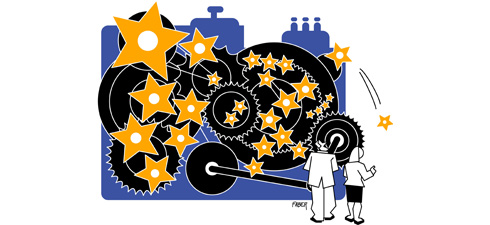The new diplomatic service of the EU will be phased in just as summer ends. Its creation has been marked by difficulties linked to protracted talks between the Commission, the European Council, the Strasbourg Parliament, and of course Lady Ashton, the British baroness named as the High Representative for Foreign Affairs and Security Policy following the ratification of the Treaty of Lisbon.
As always, at the heart of the dealing lies the question of the distribution of power among the various players, who represent the different branches of the EU: How are tasks distributed between the Commission and this new service, notably in the sensitive dossiers concerning development aid and humanitarian projects? How much control will the Parliament have over the High Representative for Foreign Affairs and Security Policy and this new diplomatic service? Who will be responsible for its administration?
Behind the struggle waged by each of the principal actors to defend his or her role and privileges, there remain certain questions on basic principles: the Commission is a supranational organisation, as is the Parliament; conversely, the Council, to which Lady Ashton is attached, is composed of sovereign states. This indirectly creates yet another battlefield for proponents of collective action versus the interests of individual sovereign states.
The final decision is the fruit of a rather torturous process and several compromises: in principle, the political aspects external to EU interests will be the domain of Lady Ashton and her diplomatic personnel, while financial resources will be managed by the Commission. The EEAS will only be allowed to participate in non-financial strategic planning, except at best in the case of monetary instruments earmarked for development projects.
No one expected that the creation of a veritable European diplomatic corps and the definition of its role would happen without clashes, and it is still possible that such a compromise will work. Without a doubt, its structure will be anything but modest, with 6000 to 7000 diplomats coming from community institutions and from the 27 member states. Most will be based in Brussels, while the rest will be spread out in 136 foreign locations, for a total budget of nearly 3 billion euros.
If Europe must have a foreign policy and unified security, the creation of a diplomatic corps which supports and promotes these aims is a natural corollary to the process. In the months following her nomination to the post of High Representative, Lady Ashton has almost exclusively dedicated herself to her role.
At the same time, one can legitimately ask if it is really necessary to urgently create such a costly, complex structure at a time when national budgets have seen drastic cuts. At a time where public opinion is focused on harmonising divergent national interests and stabilising the euro and political objectives within the EU, allowing little consideration for external political policy. At a time when everyone can see that the larger external issues facing the EU, including dealings with Russia, Turkey and the United States, have met with more divergence than agreement. And finally, at a time when it is more than ever necessary to have a concrete sense of reality, one wonders if it is in the EU's best interests to advance a project whose function and role have yet to be clearly defined.
The Community machine has in the past known the problems of gargantuan bureaucracy, where the desire for prestige mixes with national ambitions: some have already placed their bets on the identity of the future Secretary General of the new European diplomatic corps, which will probably be – Hear, hear! – a Frenchman, the ambassador Vimont, flanked by – and not by chance – a German woman. However, it would be a shame if the first child of the Treaty of Lisbon were not the embryo of a concrete and efficient external policy, but rather just another weighty bureaucracy, the fruit of secret agreements, with no identity of its own.
Was this article useful? If so we are delighted!
It is freely available because we believe that the right to free and independent information is essential for democracy. But this right is not guaranteed forever, and independence comes at a cost. We need your support in order to continue publishing independent, multilingual news for all Europeans.
Discover our subscription offers and their exclusive benefits and become a member of our community now!












